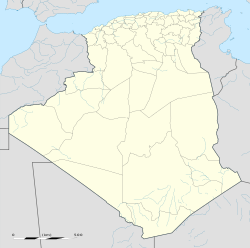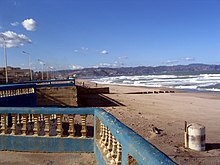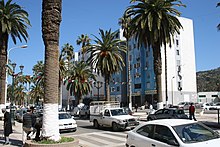Skikda
|
سكيكدة ⵙⴽⵉⴽⴷⴰ Skikda |
||
|---|---|---|
|
|
||
| Coordinates | 36 ° 52 ' N , 6 ° 55' E | |
| Basic data | ||
| Country | Algeria | |
| ISO 3166-2 | Double room | |
| Residents | 174,554 (2012) | |
|
Street scene in Skikda
|
||
Skikda ( Arabic سكيكدة, DMG Sukaikida , Zentralatlas-Tamazight ⵙⴽⵉⴽⴷⴰ Skikda ), Philippeville in French times , is a port city in northeast Algeria on the Bay of Stora. It is the capital of the Skikda Province . Picturesque bays line the city to the east and west.
history
In Phoenician times the city was named Thapsus after the nearby river that flows into the sea between the two hills Beni-Melek and Skikda. The history of Skikda is closely linked to the Storas, now a district of Skikda. Stora was already an important trading port in Phoenician times, which gave the city of Cirta, now Constantine , access to the Mediterranean . The Phoenician origin becomes clear through the origin of the name Stora from Astora, Astarte. Astarte is a deity from the Phoenician pantheon. During the Carthaginian or Punic times (7th – 1st century BC) the name expanded to Thapsus Rusikada. The name component Rus, Phoenician Rš = "cape" indicates Carthaginian origin from which today's long form of the name Ras Skikda is derived.
After the fall of Carthage, the Roman era began. The large number of Roman ruins and tombs, including an amphitheater and an aqueduct , indicate that Rusikada was an important trading center during this period as well. The city was conquered by the Vandals in 430 AD and incorporated into the Vandal Empire. This epoch ended with the decline of the Vandal Empire in 533 AD. After that, the region came under the control of Eastern Electricity (Byzantium).
The region was conquered and Islamized by the Arabs very early, at the end of the 7th century . In the 16th century it came under Turkish rule.
In 1838, Skikda was occupied by French troops in the course of the conquest and colonization of Algeria . First the city was named "Port of France", a few years later it was renamed Philippeville in memory of the French King Louis Philippe . Colonization was swiftly driven south from Philippeville across the Saf-Saf Valley to Constantine . In order to secure this corridor, European settlements were created. In order to strengthen the region economically, the construction of the railway line between Constantine and Philippeville began in 1859 and, almost at the same time, in 1860, construction work for a modern port began. In 1883 the city was hit by an earthquake.
In 1955, during the Algerian War, the FLN murdered 123 French and Arabs suspected of collaboration. The French responded with reprisals . They killed between 3,000 and 5,000 Algerians through mass shootings as well as artillery and aerial bombardments. After independence from France in 1962, the city was renamed "Skikda".
Skikda today
According to a calculation for 2012, the city has 174,554 inhabitants. It is growing steadily due to the economic pull of the petrochemical and gas industries, which visibly pollute the environment. The city is still a popular destination for domestic tourists in the summer months and, in addition to the spacious harbor area, has beaches along a beach promenade that is attached to the north side.
The bloody civil war in the 1990s largely passed Skikda by. Arbitrary acts of terrorism have only occurred in isolated cases, with the continuing tensions in the political fabric of Algeria also causing a radicalization of views in Skikda, and the freedom of movement of the inhabitants has given way to strong social control.
The region's economy is based on the lively port activities . There is a fishing port, a container port, and a gas and oil port. The main export items are liquefied natural gas and petrochemical products. Skikda has one of the world's largest helium extraction plants , a German-Algerian company (Linde-Sonatrach). The helium is obtained from natural gas that is extracted from the Hassi R'Mel deposits 600 km to the south-west and transported to Skikda via a pipeline . In the 750 km southern fields around the oasis Hassi Messaoud is petroleum promoted and also transported via pipeline to Skikda. In the industrial zone, which is several km² in size, further projects are to be implemented by 2008, including an 825 MW power plant to supply the region and the industrial zone.
sons and daughters of the town
- Ahmed Oudjani (1937–1998), Algerian-French football player
- Dalil Boubakeur (* 1940), liberal Muslim clergyman
- Abdellah Jaballah (* 1956), Algerian politician
Climate table
| Skikda | ||||||||||||||||||||||||||||||||||||||||||||||||
|---|---|---|---|---|---|---|---|---|---|---|---|---|---|---|---|---|---|---|---|---|---|---|---|---|---|---|---|---|---|---|---|---|---|---|---|---|---|---|---|---|---|---|---|---|---|---|---|---|
| Climate diagram | ||||||||||||||||||||||||||||||||||||||||||||||||
| ||||||||||||||||||||||||||||||||||||||||||||||||
|
Average monthly temperatures and rainfall for Skikda
Source: wetterkontor.de
|
|||||||||||||||||||||||||||||||||||||||||||||||||||||||||||||||||||||||||||||||||||||||||||||||||||||||||||||||||||||||||||||||||||||||||||||||||||||||||||||||||||||||||||||||||||||||||||||||||||
Web links
- http://users.antrasite.be/ppoisse/Documents/skikda.htm
- http://www.wilayadeskikda.com/
- http://www.wilayadeskikda.com/histoire_antique.html
Individual evidence
- ^ The New York Times : Earthquake Shock in Algeria. October 10, 1883
- ↑ Roger Vétillard, “20 août 1955: le jour où l'Algérie a basculé”, La Nouvelle Revue d'Histoire, no 9H, Automne-Hiver 2014, pp. 22-24
- ↑ Skikda: The most important places with statistics on their population. World Gazetteer



